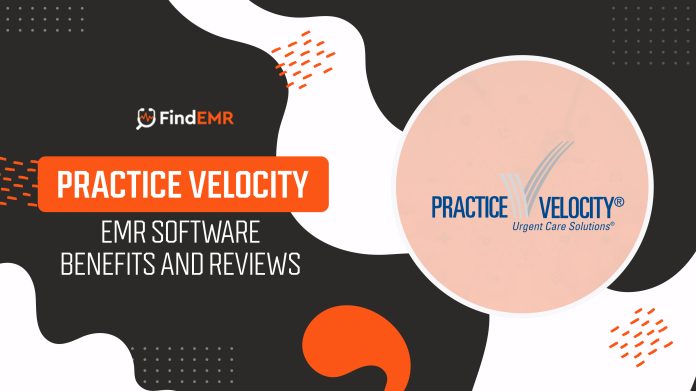Practice Velocity EHR software offers a range of EMR solutions for urgent care, along with billing and consulting services. It can used by individual doctors and small to medium-sized medical clinics. Doc EMR is cloud-based and features point and click functionality. It generates pertinent questions, diagnoses, procedures automatically. It also gives a exit care instructions.
VelociDoc EHR for Urgent Care streamlines patient visits
VelociDoc Urgent Care EHR Software is a web-based, fully integrated EMR system that streamlines patient visits and increases revenue. It includes an appointment scheduling tool, auto reminders, and electronic prescribing. VelociDoc integrates with PVM Practice Management Software, which is a popular choice for small and medium-sized urgent care centers. It simplifies patient care and reduces administrative costs.
VelociDoc Urgent Care software has allowed Physicians Immediate Care LLC to streamline operations in several states. Physicians Immediate Care LLC can now grow with this new system. VelociDoc Urgent Care EMR Software offers many benefits that help physicians increase their productivity and patient satisfaction.
VelociDoc EHR software for Urgent Care is an industry-leading EHR solution. It allows physicians to digitally record patient visit data. It automates patient visits and medical billing. You can customize it to suit your urgent care practice’s workflow.
Offers data-based insight to assist providers in staying on top of financial and clinical strategies
Healthcare providers are increasingly relying on data-driven insights. These insights can help providers improve their patient care quality and keep track of their clinical and financial strategies. Healthcare organizations can use innovative technologies such as web portals, tablet computers, and telephonic interactive system to collect and analyze outcome data.
Providers can use data-based costing systems to understand the costs of patient care. Healthcare organizations often lack the data required to determine how much their care costs and how they relate to patient outcomes. As Medicare and Medicaid pay only a fraction of what private insurance plans cost, many healthcare organizations struggle to lower their costs. Additionally, more doctors and independent hospitals are joining health systems to become salaried workers. This transition will be complex and long.
Integration with InteliChart’s Patient Portal
Patients can have 24/7 access to their health information by integrating InteliChart Patient Portal into their electronic health record. This will make it easier for patients to manage their health. Patients will be able view their medical records, access educational materials, and get discharge instructions from one location. Patients who live far away from their healthcare provider will be able communicate with them directly.
This integration made possible by a strategic partnership between InteliChart, NextGen Health Care, a leading provider EHR and practice management software. The partnership will be beneficial to thousands of NextGen providers who use InteliChart’s patient portal. InteliChart’s API makes it easy to integrate with other EHR systems.
InteliChart has been a trusted partner for more than 40 EHR software solutions. It provides comprehensive patient engagement solutions to EHR users and reduces customer churn. Its patient-facing solutions allow practices to remain competitive by reducing administrative burdens, and improving patient engagement.
Access to patient records
One way to improve patient care is by providing patient health records. It can also lead to a variety of problems. It can lead to increased inequalities. Resource might be diverted to people who are able to read the notes and ask questions about the care received. Privacy breaches can also be a result. Healthcare organizations need to carefully consider the possible impact of this system.
Section 18 of the Public Health Law outlines how records can be made available to qualified individuals. The provider may refuse access to records if the conditions are met. The patient may appeal such a decision. The provider must also provide a formal denial and appeal form to qualified persons.
Covered entities may charge a small fee to facilitate access. The type of records requested may affect the amount charged. According to the Board of Pharmacy, the amount charged should be equal to the cost of access. This is especially important if the individual cannot pay for the copies. The covered entity must also ensure compliance with all applicable federal and state laws concerning the use of patient information.


